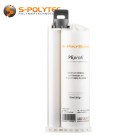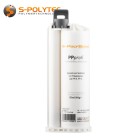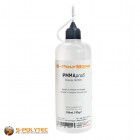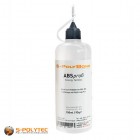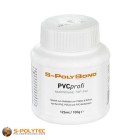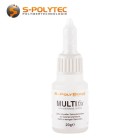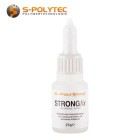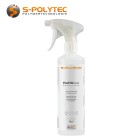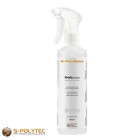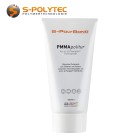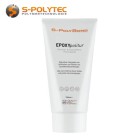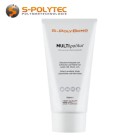
High quality adhesives from S-Polytec
Buy your adhesives cheaply online from S-Polytec and benefit from high-quality adhesives, which are used even by professional users from industry and trade. Regardless of whether you want to bond metal with plastic, metal with metal, plastic with concrete, or even polyethylene - we have got the right adhesive for you in our delivery program.
- Our adhesives are specially selected and meet almost all areas of application
- All of our adhesives meet the high quality standards for professional applications
- Benefit from our low graduated prices and fast delivery times
PE adhesive - S-Polybond PEprofi 50ml
 from €23.50 / pcs
from €23.50 / pcsIncl. 19% Tax
PP adhesive - S-Polybond PPprofi 50ml
 from €23.50 / pcs
from €23.50 / pcsIncl. 19% Tax
Acrylic adhesive - S-Polybond PMMAprofi 100ml

ABS adhesive - S-Polybond ABSprofi 100ml
 €9.90 / pcs
€9.90 / pcsIncl. 19% Tax
PVC adhesive - S-Polybond PVCprofi 125ml
 €9.90 / pcs
€9.90 / pcsIncl. 19% Tax
Superglue S-Polybond MULTIfix 20g (highly reactive)
 €4.90 / pcs
€4.90 / pcsIncl. 19% Tax
Superglue S-Polybond STRONGfix 20g (gap-filling)
 €4.90 / pcs
€4.90 / pcsIncl. 19% Tax
S-Polybond PLASTICclean - Plastic cleaner 500ml

S-Polybond PMMAclean - Acrylic and plexiglass cleaner 500ml

S-Polybond PMMApolitur - Acrylic and plexiglas polishing paste 150ml

S-Polybond EPOXYpolitur - Polishing compound for resin 150ml
 €10.90 / pcs
€10.90 / pcsIncl. 19% Tax
S-Polybond MULTIpolitur - Universal polishing paste 150ml

Buy the right plastic adhesive at S-Polytec
As a specialist dealer for plastic sheets, plastic sheet blanks and individual milled parts made of plastic, we naturally also stock suitable adhesives for our high-quality plastics in our online shop. From universal adhesives for the most common plastics, which also bond plastics to metal, among other things, to special, particularly strong bonding 2-component adhesives for ABS, ASA/ABS, polyamide and rubber, to the PE adhesive on a 2-component basis, which was specially developed for bonding PE and PP plastics.
No matter which plastics you would like to bond - we at S-Polytec have the right adhesive at favourable prices!
What is adhesive?
An adhesive is defined as such by the European Standard EN 923, which states that it is a non-metallic substance that joins materials by surface adhesion (known as adhesion) so that, after appropriate curing, a strong bond and sufficient internal strength (known as cohesion) is produced.
Adhesives are basically divided into physical and chemical adhesives.
Physical adhesives are adhesives that are already ready for use in the correct mixing ratio. The most common type of physical adhesives for plastics are solvent-based adhesives in which an appropriate solvent dissolves the surface to be bonded and evaporates over time, creating a permanent bond.
With chemical adhesives, on the other hand, which are also known as reaction adhesives, the correct mixing ratio of the chemical components is not carried out until they are applied to the material, whereby a chemical reaction sets the bonding process in motion during curing. Our special 2-component adhesive Weldyx Polyplast for PE and PP is representative of reaction adhesives.
What should be considered when selecting adhesives?
There are a few points to consider when choosing the right adhesive. Not every adhesive is suitable for every material. It should also be taken into account with which material the chosen plastic is to be bonded, because the adhesive must also be suitable for this.
Some plastics, such as polyethylene (PE), require a special adhesive, which we naturally also have in our product range for you.
Not only the choice of materials to be bonded plays a role in the selection of the adhesive, but also the thermal properties and the size of the surface to be bonded can be important criteria in the choice of the adhesive.
Likewise, the fixing time and the curing time of an adhesive are important factors.
How do you bond plastic correctly?
To achieve a perfect bond, it is important that the manufacturer's specifications regarding the plastics to be bonded and the processing are adhered to. This applies not least to the processing temperatures and curing times of the respective adhesive.
The materials to be bonded should always be prepared for bonding, which means that the areas to be bonded should be cleaned of dust and grease (this applies to fingerprints, for example) in order to achieve a perfect bonding result. For cleaning the surfaces, we recommend alcohol, depending on the plastic. In addition, make sure that the areas to be bonded are dry.
In some cases, depending on the material, it may be necessary to remove paint, varnish, adhesive residues or similar from the areas to be bonded. It may also be necessary to roughen the surfaces or pre-treat them with a primer.
In addition, when working with adhesives, the fixing time and the curing time of the respective adhesive should be taken into account beforehand. In the case of long fixing and curing times, measures should be taken to fix the adhesive by means of clamps, tension bands or similar aids until the curing times have fully elapsed in order to prevent the substrates to be bonded from slipping afterwards.
Adhesives usually have a best-before date. All adhesives offered in our online shop are fresh from production and have a correspondingly long remaining shelf life.
TIP: To glue cracks in plastics, they should be interrupted at the ends by drilling small holes with a cordless screwdriver. This prevents further expansion of the crack. Then you should carefully stretch the crack, apply the appropriate adhesive on both sides and join the crack together under the necessary pressure. The small holes can be filled with adhesive, depending on their size. For larger holes, it is advisable to cut plastic circles in the appropriate size and insert them precisely into the holes to glue them together.
Our product range for adhesives
- MS-Polymer Parabond 600 fast curing, permanently elastic adhesive and sealant with very high initial adhesion
- S-Polybond cold welding adhesives for ABS or PMMA
- 2-component adhesives especially recommended for polyamide, ABS, ASA and rubber
- 2-component adhesives MA310 and M300 for bonding metals and plastics
- 2-component adhesives especially for polyethylene (PE) or polypropylene (PP)
- Glass-clear plastic adhesive Ruderer L530
- Universal plastic adhesive Technicoll 8008 for bonding plastics
Suitable accessories for our adhesives
- Adhesive gun for 2-component adhesives in mixing ratio 1:1 and 1:10
- Adhesive mixer for 2-component adhesive 50ml double cartridges
- Primer Plexus PC 120 for pre-treatment of metal surfaces
Most of the adhesives offered in our online shop have a long shelf life based on the production date.
Please also note our favourable graduated prices for our adhesives.
